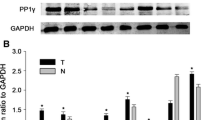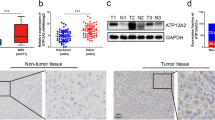Abstract
Activation of the Akt-mTORC1 signaling pathway was evaluated in premalignant and hepatocellular carcinoma (HCC) lesions by assessing the expression of pS6, an Akt effector, and PTEN, an Akt suppressor. Methods: Immunohistochemical staining for pS6 and PTEN was performed on liver tissue from 52 patients with cirrhosis, with and without HCC. Two pathologists independently evaluated pS6 staining on a semiquantitative scale and categorized PTEN staining as present or absent. Results: In the HCC group, pS6 staining was greatest in HCC, followed by dysplasia, and benign cirrhotic tissue (P < 0.001). pS6 staining was greater in cirrhotic tissue from patients with HCC compared to cirrhosis in patients without HCC (P = 0.03). PTEN staining in tumor was absent in 8/33 (24%) cases. Loss of PTEN expression was more common in patients with higher tumor stage, compared to those with stage 1 tumors (P = 0.04). Conclusion: Immunohistochemical evidence of activation of the Akt-mTORC1 pathway is associated with HCC.




Similar content being viewed by others
References
Thorgeirsson SS, Grisham JW (2002) Molecular pathogenesis of human hepatocellular carcinoma. Nat Genet 31:339–346
Edwards BK, Brown ML, Wingo PA, Howe HL, Ward E, Ries LA, Schrag D, Jamison PM, Jemal A, Wu XC, Friedman C, Harlan L, Warren J, Anderson RN, Pickle LW (2005) Annual report to the nation on the status of cancer, 1975–2002, featuring population-based trends in cancer treatment. J Natl Cancer Inst 97:1407–1427
El-Serag HB (2002) Hepatocellular carcinoma and hepatitis C in the United States. Hepatology 36:S74–S83
Llovet JM, Burroughs A, Bruix J (2003) Hepatocellular carcinoma. Lancet 362:1907–1917
Altomare DA, Testa JR (2005) Perturbations of the AKT signaling pathway in human cancer. Oncogene 24:7455–7464
Taniguchi CM, Emanuelli B, Kahn CR (2006) Critical nodes in signaling pathways: insights into insulin action. Nat Rev Mol Cell Biol 7:85–96
Rameh LE, Cantley LC (1999) The role of phosphoinositide 3-kinase lipid products in cell function. J Biol Chem 274:8347–8350
Downward J (2004) PI 3-kinase, Akt and cell survival. Semin Cell Dev Biol 15:177–182
Suhara T, Kim HS, Kirshenbaum LA, Walsh K (2002) Suppression of Akt signaling induces Fas ligand expression: involvement of caspase and Jun kinase activation in Akt-mediated Fas ligand regulation. Mol Cell Biol 22:680–691
Yoo LI, Liu DW, Le Vu S, Bronson RT, Wu H, Yuan J (2006) Pten deficiency activates distinct downstream signaling pathways in a tissue-specific manner. Cancer Res 66:1929–1939
Samuels Y, Wang Z, Bardelli A, Silliman N, Ptak J, Szabo S, Yan H, Gazdar A, Powell SM, Riggins GJ, Willson JK, Markowitz S, Kinzler KW, Vogelstein B, Velculescu VE (2004) High frequency of mutations of the PIK3CA gene in human cancers. Science 304:554
Kops GJ, Dansen TB, Polderman PE, Saarloos I, Wirtz KW, Coffer PJ, Huang TT, Bos JL, Medema RH, Burgering BM (2002) Forkhead transcription factor FOXO3a protects quiescent cells from oxidative stress. Nature 419:316–321
Tran H, Brunet A, Grenier JM, Datta SR, Fornace AJ Jr, DiStefano PS, Chiang LW, Greenberg ME (2002) DNA repair pathway stimulated by the forkhead transcription factor FOXO3a through the Gadd45 protein. Science 296:530–534
Brunet A, Bonni A, Zigmond MJ, Lin MZ, Juo P, Hu LS, Anderson MJ, Arden KC, Blenis J, Greenberg ME (1999) Akt promotes cell survival by phosphorylating and inhibiting a Forkhead transcription factor. Cell 96:857–868
El-Serag HB, Tran T, Everhart JE (2004) Diabetes increases the risk of chronic liver disease and hepatocellular carcinoma. Gastroenterology 126:460–468
Demetris AJ (2004) Transplantation pathology of the liver. In: Odze RD, Goldblum JR, Crawford JM (eds) Surgical pathology of the GI tract, liver, biliary tract, and pancreas. Elsevier, Philadelphia, pp 910–913
Hirohashi S (2000) World Health Organization classification of tumors pathology and genetics tumors of the digestive system. Paris, IARC Press
Rebello Pinto M, Koelma IA, Kumar D (1994) Fine needle aspiration of focal liver lesions. Cytopathology 5:359–368
Anthony PP, Vogel CL, Barker LF (1973) Liver cell dysplasia: a premalignant condition. J Clin Pathol 26:217–223
Anthony PP (1976) Precursor lesions for liver cancer in humans. Cancer Res 36:2579–83
Terminology of nodular hepatocellular lesions (1995) International working party. Hepatology 22:983–993
Hsu SM, Raine L, Fanger H (1981) A comparative study of the peroxidase-antiperoxidase method and an avidin-biotin complex method for studying polypeptide hormones with radioimmunoassay antibodies. Am J Clin Pathol 75:734–738
Nakanishi K, Sakamoto M, Yamasaki S, Todo S, Hirohashi S (2005) Akt phosphorylation is a risk factor for early disease recurrence and poor prognosis in hepatocellular carcinoma. Cancer 103:307–312
Balsara BR, Pei J, Mitsuuchi Y, Page R, Klein-Szanto A, Wang H, Unger M, Testa JR (2004) Frequent activation of AKT in non-small cell lung carcinomas and preneoplastic bronchial lesions. Carcinogenesis 25:2053–2059
Roy HK, Olusola BF, Clemens DL, Karolski WJ, Ratashak A, Lynch HT, Smyrk TC (2002) AKT proto-oncogene overexpression is an early event during sporadic colon carcinogenesis. Carcinogenesis 23:201–205
Sahin F, Kannangai R, Adegbola O, Wang J, Su G, Torbenson M (2004) mTOR and P70 S6 kinase expression in primary liver neoplasms. Clin Cancer Res 10:8421–8425
Xu X, Sakon M, Nagano H, Hiraoka N, Yamamoto H, Hayashi N, Dono K, Nakamori S, Umeshita K, Ito Y, Matsuura N, Monden M (2004) Akt2 expression correlates with prognosis of human hepatocellular carcinoma. Oncol Rep 11:25–32
Sieghart W, Fuereder T, Schmid K, Cejka D, Werzowa J, Wrba F, Wang X, Gruber D, Rasoul-Rockenschaub S, Peck-Radosavljevic M, Wacheck V (2007) Mammalian target of rapamycin pathway activity in hepatocellular carcinomas of patients undergoing liver transplantation. Transplantation 83:425–432
Hay N, Sonenberg N (2004) Upstream and downstream of mTOR. Genes Dev 18:1926–1945
Rahman MA, Kyriazanos ID, Ono T, Yamanoi A, Kohno H, Tsuchiya M, Nagasue N (2002) Impact of PTEN expression on the outcome of hepatitis C virus-positive cirrhotic hepatocellular carcinoma patients: possible relationship with COX II and inducible nitric oxide synthase. Int J Cancer 100:152–157
Hu TH, Huang CC, Lin PR, Chang HW, Ger LP, Lin YW, Changchien CS, Lee CM, Tai MH (2003) Expression and prognostic role of tumor suppressor gene PTEN/MMAC1/TEP1 in hepatocellular carcinoma. Cancer 97:1929–1940
Horie Y, Suzuki A, Kataoka E, Sasaki T, Hamada K, Sasaki J, Mizuno K, Hasegawa G, Kishimoto H, Iizuka M, Naito M, Enomoto K, Watanabe S, Mak TW, Nakano T (2004) Hepatocyte-specific Pten deficiency results in steatohepatitis and hepatocellular carcinomas. J Clin Invest 113:1774–1783
Watanabe S, Horie Y, Suzuki A (2005) Hepatocyte-specific Pten-deficient mice as a novel model for nonalcoholic steatohepatitis and hepatocellular carcinoma. Hepatol Res 33:161–166
Del Bufalo D, Ciuffreda L, Trisciuoglio D, Desideri M, Cognetti F, Zupi G, Milella M (2006) Antiangiogenic potential of the Mammalian target of rapamycin inhibitor temsirolimus. Cancer Res 66:5549–5554
Smolewski P (2006) Recent developments in targeting the mammalian target of rapamycin (mTOR) kinase pathway. Anticancer Drugs 17:487–494
Kneteman NM, Oberholzer J, Al Saghier M, Meeberg GA, Blitz M, Ma MM, Wong WW, Gutfreund K, Mason AL, Jewell LD, Shapiro AM, Bain VG, Bigam DL (2004) Sirolimus-based immunosuppression for liver transplantation in the presence of extended criteria for hepatocellular carcinoma. Liver Transpl 10:1301–1311
Author information
Authors and Affiliations
Corresponding author
Rights and permissions
About this article
Cite this article
Cotler, S.J., Hay, N., Xie, H. et al. Immunohistochemical Expression of Components of the Akt-mTORC1 Pathway is Associated with Hepatocellular Carcinoma in Patients with Chronic Liver Disease. Dig Dis Sci 53, 844–849 (2008). https://doi.org/10.1007/s10620-007-9934-x
Received:
Accepted:
Published:
Issue Date:
DOI: https://doi.org/10.1007/s10620-007-9934-x




